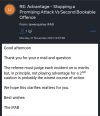I've had a go..suspect they will say referee has to consider x y z and not commit but let's see.
Question asked:
"Dear IFAB
In the Advantage section of law 12 it says the following (emphasis my own as part of my question).
"If the referee plays the advantage for an offence for which a caution/ sending-off would have been issued had play been stopped, this caution/ sending-off must be issued when the ball is next out of play. However, if the offence was denying the opposing team an obvious goal-scoring opportunity, the player is cautioned for unsporting behaviour; if the offence was interfering with or stopping a promising attack, the player is not cautioned.
Advantage should not be applied in situations involving serious foul play, violent conduct or a second cautionable offence unless there is a clear opportunity to score a goal. The referee must send off the player when the ball is next out of play, but if the player plays the ball or challenges/interferes with an opponent, the referee will stop play, send off the player and restart with an indirect free kick, unless the player committed a more serious offence."
Question:
A player, that has already received a caution in a match commits a careless foul, that interferes with/stops a promising attack.
There is an opportunity to play advantage, but not a clear opportunity to score.
The referee has to make a decision on which provision, highlighted above, takes precedence.
What action should the referee take?
Playing advantage would mean the player is not cautioned. However, the law says that advantage should not be applied in cases involving a second caution-able offence, but it only becomes a caution if the referee stops play and doesn't play advantage.
The two provisions don't seem to work well together and i wondered if there was an order of preference in this scenario for these 2 provisions?"
Answer to follow on receipt.




